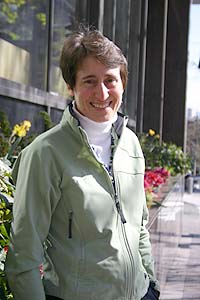|
Subscribe / Renew |
|
|
Contact Us |
|
| ► Subscribe to our Free Weekly Newsletter | |
| home | Welcome, sign in or click here to subscribe. | login |
Real Estate
| |
March 25, 2005
Jewell is happiest hiking up a steep learning curve
Journal Staff Reporter

Sally Jewell says the idea that stores would be replaced by the Internet was "completely absurd."
|
Recreation Equipment Inc.'s incoming CEO Sally Jewell may be typical of the 66-year-old co-op's members: she can't fit her car in her garage for all the mountain-climbing, sailing and backcountry ski gear piled up inside.
Last September, the 49-year-old University of Washington graduate and mother of two climbed Mount Rainier.
But her professional background, starting as an engineer on the Alaska Pipeline and then in the Oklahoma oil fields for Mobil, may set her apart — both from REI's famously earthy-crunchy members and from other CEO's of major retail chains.
Jewell says her background in mechanical engineering has been invaluable to her during 19 years in banking and five years as chief operating officer at REI.
"I loved engineering," she says. "It teaches how to solve problems, how to be inquisitive. If something doesn't add up, there's a built-in instinct to question."
She says that instinct served her well in banking — figuring out what made thousands of companies succeed or fail — and at REI.
When she joined the REI staff in 2000, the conventional wisdom was that brick-and-mortar stores were dinosaurs about to become extinct, replaced by the Internet.
"It was completely absurd," she says.
Five years later, brick-and mortar remains REI's bread and butter. While "direct" (Internet and catalog) sales are growing faster than in-store sales, physical stores still generate 85 percent of REI's sales, and REI continues to build and open new stores around the country.
Last year, REI opened seven new stores and relocated two others, including a move from Lynnwood to the mall in Alderwood. She said the 1996 move from the Capitol Hill store to the new flagship store next to I-5 has doubled sales.
REI will open 8 new stores this year.
The co-op has in-house architects that partner with outside firms to design stores. Jewell said that REI has worked with Mithun more than any other firm.
REI's new store in Portland's Pearl District won a LEED (Leadership in Energy and Environmental Design) gold rating for commercial interiors, the first retail store in the U.S. to achieve this standard.
"Earning a gold distinction is tough," said Rick Fedrizzi of the U.S. Green Building Council. "REI's rating is a testament to this company's commitment to environmental responsibility."
The Pearl District store occupies the first two floors of a 10-story mixed-use building.
REI used local and recycled materials, non-formaldehyde composite wood, non-VOC paint, low-VOC carpet, water-saving fixtures and sensors that shut down electric lights whenever ambient light is bright enough. All but 4 percent of construction waste was recycled.
None of the other facilities REI opened last year earned LEED certification, though Jewell says the co-op has long used green building practices.
"We're going out of our way to build buildings that would qualify (for LEED certificiation) if we applied," she says. "It's not about marketing, we're just trying to do the right thing."
Jewell says though REI sometimes restores old buildings for new stores, the co-op has not focused on whether its stores are contributing to suburban sprawl or urban revitalization when choosing locations.
"You take what real estate you can find," she says. "It still has to be a good location for our customers."
Jewell says sustainability and corporate responsibility, especially concerning working conditions at REI's overseas suppliers, will be big emphases for her as CEO.
REI is no stranger to importing: it started in 1938 by selling ice axes from Austria to Seattle mountain climbers. Today, REI sells goods manufactured all over the world. China is REI's leading overseas supplier.
REI makes suppliers sign detailed guidelines, audits them and shuts them down if they don't comply, according to Jewell.
On sustainability, REI may lag behind competitor Patagonia, which has green buildings but also sells fleece made of recycled soda bottles and nothing but organic cotton. But Jewell says REI gives generously to support environmental education and is working hard to learn where the company's activities cause the most environmental harm and where they can make the most effective change.
"I'm happiest when I'm on the steepest part of the learning curve," she says. Taking the helm of a retail chain with nearly $900 million in sales last year, "I'm still on it."


